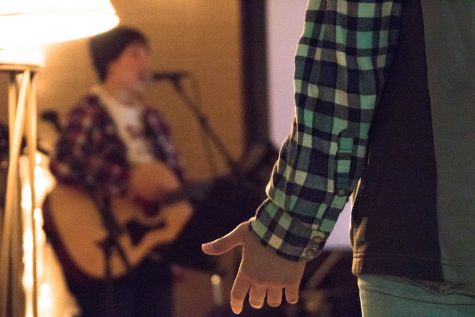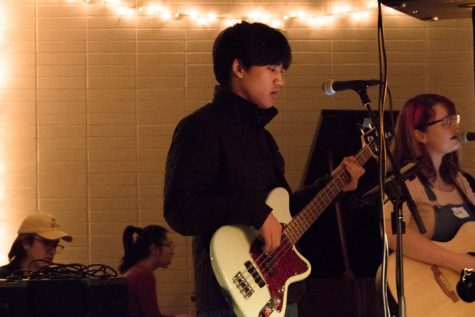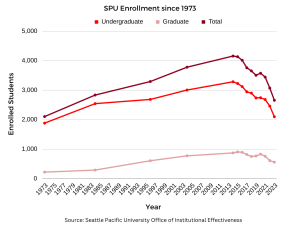Group shifts focus toward inclusivity
Exploring God through lens other cultures
November 21, 2019

A student worshiping at “Group on the Road” in Hill Hall.
Since its inception, America has been plagued by conflict and tension between races.
Despite the rosy conceptions of some, fear, prejudice, and oppression of minorities has long outlasted the civil rights movement and has persisted to this very day.
A central tenet of the Christian faith is that Christ is a God for all people, both Jew and Gentile, and that followers of Christ are called to be peacemakers.
Group is actively pursuing reconciliation through their services on campus by devoting extra focus towards being more inclusive of other cultures.
“We hope that group is a place where everyone feels welcome, where everyone feels like they belong no matter what their background,” Group coordinator and junior Olivia Nolin said.
Group, a student led service, meets every Wednesday at 8 p.m. for worship, readings of scripture and group discussion.
They provide a fresh take on the traditional liturgy of the Christian church and incorporate activities not commonly seen in church services, such as watercolor painting.
Whether it is the songs they sing or the biblical concepts they emphasize, they are making efforts to step outside of the Eurocentric culture that’s historically dominated the church. .
This effort has been a long time in the making.
Back in January, Priscilla Onyedikachi Ozodo, minister of worship and production and Group director, applied for a grant from the Calvin Institute of Christian Worship that would allow them to learn how to incorporate other cultures into their worship services.
As part of the grant, they attended a conference in Chicago where they learned from leaders on the matter, including Sandra Van Opstal, the author of “The Next Worship.”

Livvy Nolin reading a passage from the Bible during “Group on the Road.
According to sophomore Audreya Bell, who plays acoustic guitar for Group, they were particularly moved by the following passage from Revelations 7:9-10, which was emphasized at the conference:
“I looked, and behold, a great multitude that no one could number, from every nation, from all tribes and peoples and languages … crying out with a loud voice, ‘Salvation belongs to our God who sits on the throne.’”
In an effort to replicate this prophetic vision, Group leaders spent days learning worship songs in other languages that utilize instruments and genres foreign to western culture.
They spent time specifically learning languages spoken by international students on campus.
“As an international student, speaking my own language (Vietnamese) minds me of home,” sophomore Bonnie Tran, who plays the piano for Group, said.
These multicultural worship services also allow students to explore methods of worship that they may have never encountered before.
“I was born a Catholic in Vietnam and the way I worship is to stand very still and sing. But being a part of Group this year, I get to experience worship in very, very different ways,” Tran said.
By worshipping in a different manner — jumping, shouting and clapping — Tran believes that she’s found a deeper connection to the Holy Spirit; that she feels it “moving through” her like never before.
These connections sparked an ambition in Group leaders to share this experience, beyond those who are regulars at Group services.
They realized this ambition in late October when they hosted their first “Multicultural Night of Worship,” an event that focused on celebrating worship styles prominent in Latin America.
They plan to organize multicultural worship services every quarter, with each focusing on a different cultures’ take on the Christian faith
These multicultural services are not solely for the benefit of international students either; as someone who grew up in what she described as a “very white Western American” context,
Nolin grew and learned a lot from the process of organizing Group services.
She believes that it has made her more sensitive to other cultures and has given her a greater appreciation for God as a God for all people.
In living out this belief, Group leaders have come to realize that people of every culture see Christ differently. For example, different cultures tend to emphasize different aspects of God.
“Caucasian cultures focus a lot on God’s grace and salvation, while African American and Latin cultures focus on God’s ability to bring freedom and liberation,” Ozodo said.
Ozodo does not believe that any of these conceptions of God are right or wrong, or that one is better than the other; rather, they are all important parts of God’s character.
Through highlighting each culture’s style of worship, Ozodo believes Group members can develop a more well-rounded vision of who God really is.
Many churches do not take similar measures to accommodate other cultures because they find comfort in tradition and are made uneasy by change.

Paul Park playing the bass at “Group on the Road”.
While Ozodo doesn’t dispute that embracing diversity can be a very difficult and uncomfortable process, she insists that it is well worth it.
“You may be challenged to sing songs that are not familiar to you, or say prayers in other languages. Please embrace these changes as we seek to worship a culturally rich God who seeks for us to be united through diversity,” Ozodo said.

























































































